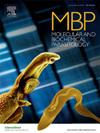AUK3 is required for faithful nuclear segregation in the bloodstream form of Trypanosoma brucei
IF 1.4
4区 医学
Q4 BIOCHEMISTRY & MOLECULAR BIOLOGY
引用次数: 0
Abstract
Eukaryotic chromosomes segregate faithfully prior to nuclear division to ensure genome stability. If segregation becomes defective, the chromosome copy number of the cell may alter leading to aneuploidy and/or polyploidy, both common hallmarks of cancers. In eukaryotes, aurora kinases regulate chromosome segregation during mitosis and meiosis, but their functions in the divergent, single-celled eukaryotic pathogen Trypanosoma brucei are less understood. Here, we focused on one of three aurora kinases in these parasites, TbAUK3, a homologue of the human aurora kinase AURKC, whose functions are primarily restricted to meiosis. We show that RNAi targeted depletion of TbAUK3 correlates with nuclear segregation defects, reduced proliferation, and decreased DNA synthesis, suggestive of a role for TbAUK3 during mitotic, not meiotic, chromosome segregation. Moreover, we uncover a putative role for TbAUK3 during the parasite's response to DNA damage since we show that depletion of TbAUK3 enhances DNA instability and sensitivity to genotoxic agents.
AUK3是布鲁氏锥虫血流形式中可靠的核分离所必需的。
真核生物的染色体在核分裂前忠实地分离以确保基因组的稳定性。如果分离出现缺陷,细胞的染色体拷贝数可能会改变,导致非整倍体和/或多倍体,这两种都是癌症的常见特征。在真核生物中,极光激酶在有丝分裂和减数分裂过程中调节染色体分离,但它们在分化的单细胞真核病原体布鲁氏锥虫中的功能尚不清楚。在这里,我们重点研究了这些寄生虫中的三种极光激酶之一TbAUK3,它是人类极光激酶AURKC的同源物,其功能主要局限于减数分裂。我们发现,RNAi靶向TbAUK3的缺失与核分离缺陷、增殖减少和DNA合成减少有关,这表明TbAUK3在有丝分裂而非减数分裂中染色体分离中起作用。此外,我们发现TbAUK3在寄生虫对DNA损伤的反应中可能发挥的作用,因为我们表明TbAUK3的耗尽会增强DNA的不稳定性和对遗传毒性药物的敏感性。
本文章由计算机程序翻译,如有差异,请以英文原文为准。
求助全文
约1分钟内获得全文
求助全文
来源期刊
CiteScore
2.90
自引率
0.00%
发文量
51
审稿时长
63 days
期刊介绍:
The journal provides a medium for rapid publication of investigations of the molecular biology and biochemistry of parasitic protozoa and helminths and their interactions with both the definitive and intermediate host. The main subject areas covered are:
• the structure, biosynthesis, degradation, properties and function of DNA, RNA, proteins, lipids, carbohydrates and small molecular-weight substances
• intermediary metabolism and bioenergetics
• drug target characterization and the mode of action of antiparasitic drugs
• molecular and biochemical aspects of membrane structure and function
• host-parasite relationships that focus on the parasite, particularly as related to specific parasite molecules.
• analysis of genes and genome structure, function and expression
• analysis of variation in parasite populations relevant to genetic exchange, pathogenesis, drug and vaccine target characterization, and drug resistance.
• parasite protein trafficking, organelle biogenesis, and cellular structure especially with reference to the roles of specific molecules
• parasite programmed cell death, development, and cell division at the molecular level.

 求助内容:
求助内容: 应助结果提醒方式:
应助结果提醒方式:


